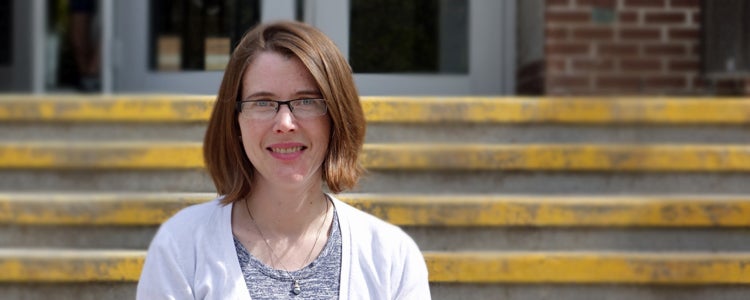 |
|
Dr. Cynthia Richard, School of Pharmacy |
Written by Elorm Agbeyaka, Special Projects (Teaching Stories), CTE
Dr. Cynthia Richard, a Clinical Lecturer in UWaterloo’s School of Pharmacy, admits that her first time teaching went poorly. Indeed, after some grave course reviews, she questioned whether teaching was truly something that she was meant to do. Fortunately, Richard soon had a realization: teaching is a skill, and like any skill it can be learned and practiced: “Failing on my first attempt,” she says, “does not mean that I’m going to rule it out for the rest of my life!” Her efforts to improve paid off: in 2012, she received the Excellence in Science Teaching Award.
Richard firmly believes that the best teachers are themselves learners: they recognize the limits of their knowledge and they take steps, as needed, to undertake additional learning. Accordingly, she believes that instructors in the School of Pharmacy need not have a comprehensive knowledge of a topic prior to teaching it. “Teaching,” she says, “is not about being an expert. It’s not about having the attitude of ‘You’re going to learn so much from me’. Instead, it’s ‘We’re going to create activities so we can all learn together.’”
This idea of continuous learning has defined Richard’s teaching career. In her courses, she encourages two-way feedback: she provides her students with feedback on their assignments so that they have ample opportunities to improve, but she also asks them to provide her with feedback on the course, regarding lecture content, assignments, learning activities, and teaching strategies. “After every lesson or activity, I seek out some students to give me feedback, and I take note of it for next time.” Such feedback, says Richard, is necessary: “Just because you have taught it, does not mean the students have learned it.” Frequent feedback helps Richard ensure that her teaching and learning activities result in actual learning.
Richard’s appreciation of the benefits of timely feedback is also evident in a remediation tool – known as the Midpoint Assessment – that she helped develop and implement in the School of Pharmacy in 2015. The Midpoint Assessment comprises 100 multiple choice questions and five clinical exams, and is delivered near the end of each student’s second year. Students who score below the minimal competency meet with an assessment team that helps them design an individualized education plan to prevent them from falling further behind their peers. Last year, the Midpoint Assessment identified three out of 120 students in need of remedial support. Richard has been working with these students to improve their clinical exam competencies.
Students who have taken courses from Richard report being greatly engaged in her classroom. They cite her ability to make course content interesting and relevant, as well as her enthusiastic and supportive approach. That’s the kind of feedback any instructor wants to hear!
More Resources
CTE has developed more than 100 Teaching Tips. Each one is a succinct document that conveys useful ideas and practical methods for effective teaching. Some of the Teaching Tips that are relevant to the strategies mentioned in this Teaching Story include the following: